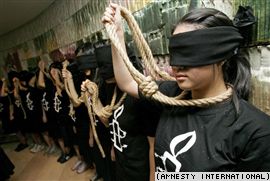 Objective and subjective conditions had risen in Belarus to discuss the death penalty abolition. MP pointed out that deliberations about the question at hand were not a result of the PACE pressure.
Objective and subjective conditions had risen in Belarus to discuss the death penalty abolition. MP pointed out that deliberations about the question at hand were not a result of the PACE pressure.
“The PACE demands would be considered but they would not be determinative in a decision making process on the death penalty moratorium. We will have to take into account all factors: political will, international situation, and public opinion,” Milalai Samaseika declared. (photo left)
Public interest
Any decision to abolish the death penalty will be taken “not to please Council of Europe or anyone else, but in a context of public and state interests,” added other Belarusian MP Ihar Karpenka.
Mikalai Samaseika did not consider mechanisms of the abolition as a primary goal. In his opinion studying conditions of the death penalty cancellation was the most important factor at this stage.
“The ratification of international treaties, changed in Criminal Code, the moratorium would pave a way for the abolition,” MP stressed. According to him, there is no need of the mass public support to introduce the moratorium since it would a temporary measure; “we could try it and then see what happens with it.”
Possible referendum
Mr Samaseika believed that a referendum would be necessary to abolish the death penalty as a particular amendment would have to be added to the Constitution. However, the moratorium option would need to be studied first.
MP added that the moratorium could be introduced either by a Parliament vote or by a presidential decree. Since this measure would a temporary one it could be very easily reversed.
“Public would have to make a conscious decision if the question went to referendum. People would need to be provided with full and conclusive information about the death penalty use in Belarus and abroad, about possible consequences of its abolition,” Tatsiana Isachenka, a member of the Parliament working group, said.
Positive step Meanwhile, international organisations welcomed the establishment of the Belarusian Parliament working group. “The fact that Belarus has this working MP group is definitely a positive step in the right direction. PACE is willing to help the Belarusian parliament in their work [on the death penalty question],” PACE President Mevlüt Çavusoglu assured.
Meanwhile, international organisations welcomed the establishment of the Belarusian Parliament working group. “The fact that Belarus has this working MP group is definitely a positive step in the right direction. PACE is willing to help the Belarusian parliament in their work [on the death penalty question],” PACE President Mevlüt Çavusoglu assured.
Belarusian HR defenders shared this opinion. A year ago they started a campaign against the death penalty.
Last in Europe
As of March 2010 Belarus is the last country in Europe that still practices the death penalty. In the 1996 referendum around 80% of those voted were against the death penalty abolition. PACE and EU put the death penalty question as a condition to lift political sanctions. In 2009 two individuals were executed in Belarus.
The Belarusian Parliament formed a special working group in 2009. Its mandate expires in summer 2010. MPs will visit Ukraine and the Russian Federation to study the situation in neighbouring countries and changes that were caused after the moratorium was introduced there.
There is a possibility that there would be a Parliament hearing on the death penalty in Belarus. Also there are plans to organise a joint panel discussion with PACE.





